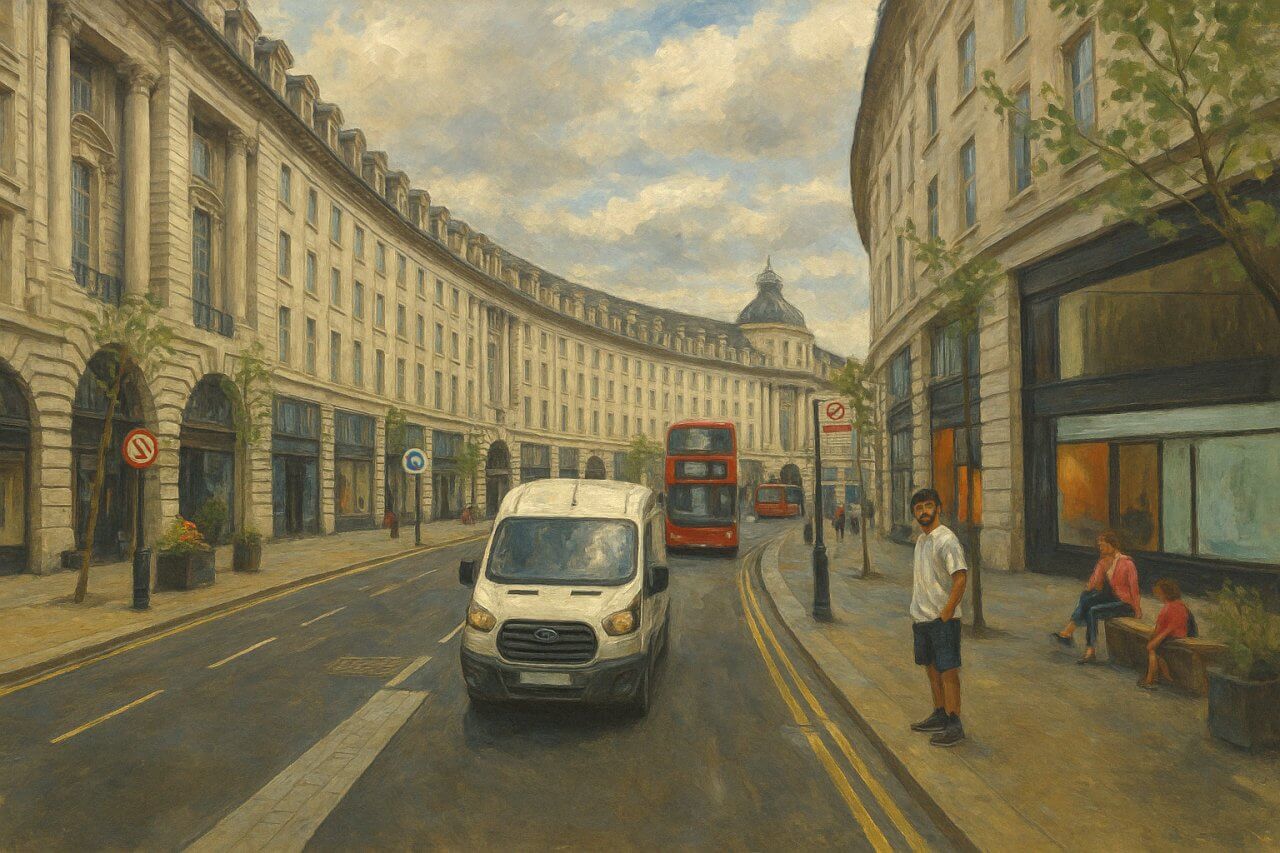
Regent Street - A Grand Curve Through London's Retail Heart
Where Is Regent Street?
Regent Street is a major thoroughfare in the City of Westminster, central London. It gracefully arcs through the West End, forming a key link between some of the capital's most famous districts: from Piccadilly in the south to Langham Place by BBC Broadcasting House in the north. A stretch of Regent Street from Piccadilly to Waterloo Place was renamed Regent Street St James's in 2014.Flanked by St James's, Soho, and Mayfair, Regent Street is both a geographic and symbolic spine of central London, separating several well-known neighbourhoods while uniting them in commercial purpose and visual grandeur.
Length of Regent Street
Regent Street stretches approximately 0.8 miles (1.3 kilometres) in length. Though not one of London's longest roads, its striking curve and cohesive architectural style make it one of the city's most distinctive and visually iconic streets.History of Regent Street
Before Regent Street was built in the early 19th century, the area it traverses was a chaotic mix of narrow alleys, overcrowded housing, and irregular lanes - particularly through St James's, Soho, and Marylebone.In 1811, architect John Nash was commissioned to design a grand new street under the instruction of Prince George, the Prince Regent, who would later become King George IV. The vision was to create an elegant processional route connecting Carlton House (his then-residence) to Regent's Park - a new development to the north.
Construction began in 1814, and the street officially opened in the 1820s. It was one of the first planned developments in London with a cohesive architectural style and a clear urban purpose: to create a prestigious shopping boulevard that also served as a ceremonial route.
How Did Regent Street Get Its Name?
The street was named after Prince George, the Prince Regent, who served as de facto monarch from 1811 due to his father King George III's illness. As the Regent, he wielded royal powers and was known for his love of the arts, architecture, and urban improvement. Naming the street after him was both an homage and a political gesture, reinforcing the grandeur and significance of the project.Roads connected to Regent Street
- A5204
- Air Street
- Beak Street
- Conduit Street
- Glasshouse Street
- Great Castle Street
- Great Marlborough Street
- Hanover Street
- Langham Place
- Little Argyll Street
- Little Portland Street
- Maddox Street
- Man In Moon Passage
- Margaret Street
- New Burlington Place
- New Burlington Street
- Oxford Street
- Vigo Street
The Character of Regent Street
Regent Street is overwhelmingly commercial in character, known primarily for its flagship retail stores, grand facades, and elegant architecture. The buildings lining the street, many of which are Grade II listed, house a mixture of luxury boutiques, fashion retailers, international brands, offices, and restaurants. There is very little residential presence on the street itself, though it borders residential areas in Mayfair and Fitzrovia.Major Buildings and Sights on Regent Street
As one of London's prime shopping destinations and historic streets, Regent Street boasts numerous landmarks and iconic shops:- Liberty London - A famous Tudor-style department store just off the street
- Hamleys - One of the world's oldest and largest toy stores
- Apple Store - A flagship location in a restored historic building
- All Souls Church - At Langham Place, designed by John Nash
- BBC Broadcasting House - Just north of the street's end
- St James's Market - Nearby modern retail and dining hub
- University of Westminster - Located at 309 Regent Street
- The Quadrant Arcade - Elegant indoor passage to Piccadilly Circus
Nearest London Underground Stations
Regent Street is well-served by several Tube stations within walking distance, making it easily accessible from all parts of London:- Oxford Circus - Bakerloo, Central, and Victoria lines
- Piccadilly Circus - Bakerloo and Piccadilly lines
- Bond Street - Central and Jubilee lines (just west of Regent Street)
- Green Park - Jubilee, Piccadilly, and Victoria lines (slightly southwest)
Fun Fact: The Street That Invented Window Shopping
One fascinating detail about Regent Street is that it helped pioneer the concept of window shopping. In the Victorian era, stores along Regent Street introduced large plate-glass display windows that allowed passers-by to browse goods before entering - a novel idea at the time. This innovation forever changed how people interact with retail environments.Another fun detail: The entire curve of Regent Street between Oxford Circus and Piccadilly Circus was once dubbed "The Quadrant", and some locals still refer to this elegant crescent using that name.
Further Reading
Read about shopping in London to get to know other streets like Regent Street which are shopping destinations.Map of Regent Street - A Grand Curve Through London's Retail Heart

Painting of Regent Street